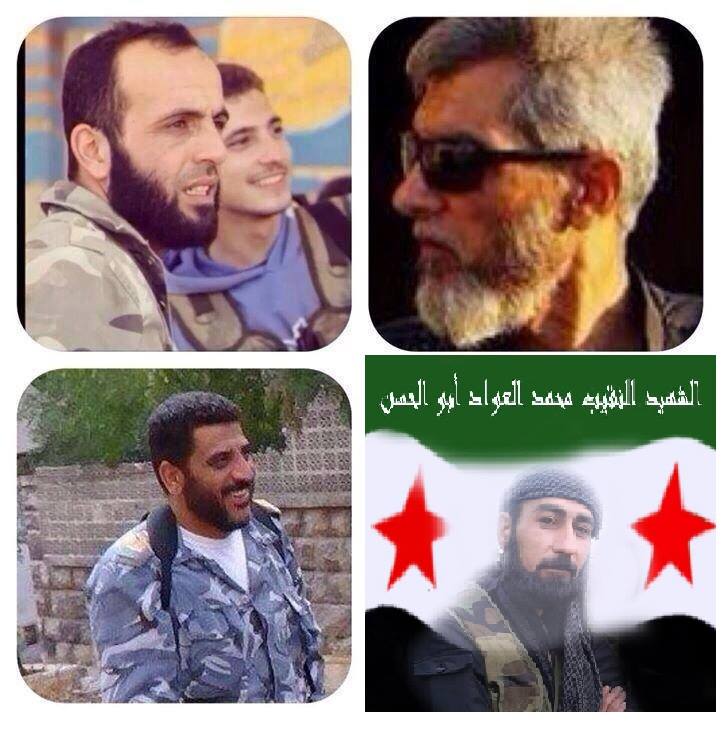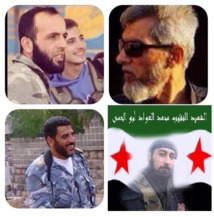His death is a blow to Islamist rebels, particularly in the Aleppo region, where Saleh came from and fought and where the regime has made a string of recent advances.
Liwa al-Tawhid announced the 33-year-old's death on its official Facebook page in news confirmed by the Britain-based Syrian Observatory for Human Rights.
"Abdel Qader Saleh, known as Hajji Marea, died of wounds he sustained last Thursday when warplanes targeted the Liwa al-Tawhid leadership," an Observatory statement said.
"He was taken to Turkey after being wounded, and died in a hospital there before being brought back to Syria for burial," Observatory director Rami Abdel Rahman told AFP.
The strike also killed Liwa al-Tawhid intelligence chief Yussef al-Abbas, known as Abu al-Tayyeb.
Liwa al-Tawhid, which is backed in part by Qatar, has some 8,000 fighters and is among a number of Islamist units that have rejected the mainstream opposition National Coalition.
However, Saleh was a most respected rebel commander with ties across the opposition seeking to oust President Bashar al-Assad, and his death was widely mourned.
The National Coalition was among those who paid tribute to him, calling Saleh, a moderate Islamist, "a living symbol in the hearts of the Syrians".
Analyst Charles Lister of the IHS Janes Terrorism and Insurgency Centre described Saleh as "very, very important".
His death, at a time of regime gains in the Aleppo region, would be "a very significant blow" to the opposition, Lister said.
For three weeks, the army has been pressing a campaign to retake rebel-held areas in and around second city Aleppo, and have recaptured a military base and a town to the southeast.
The Observatory also reported that the death toll from a rebel bomb attack on an army base near Damascus on Sunday had climbed to 48, adding the targeted building had been destroyed.
Mid-December conference target
On the political front, Syrian regime envoys held closed-door consultations in Moscow with Russian officials on efforts to organise a much-delayed peace conference on the bloody conflict.
The Russian foreign ministry did not comment on the outcome of Monday's meeting with Assad's envoys, and the Syrian team left the building without speaking to the press.
But a diplomatic source in Moscow said the Damascus delegation would continue its discussions on Tuesday with Russian Foreign Minister Sergei Lavrov.
Meanwhile, UN Secretary General Ban Ki-moon said he hoped to convene the so-called Geneva II peace conference in "mid-December".
"I am not able to announce at this time any date. Our target is mid-December," Ban told reporters during a visit to Lithuania.
He said UN-Arab League envoy Lakhdar Brahimi will try to set the date in a meeting with Russian and US representatives on November 25.
The United Nations has been trying for months to convene talks between the regime and the opposition to try to end the 32-month war which has reportedly killed more than 120,000 people and displaced millions.
But with the conflict raging on, the Pentagon said Monday that Washington will keep two Patriot missile batteries in Turkey for another year to help bolster the country's defences against threats from Syria's civil war.
The Moscow consultations came days after President Vladimir Putin held his first telephone talks with Assad in more than two years, and as Russia also invited National Coalition chief Ahmed Jarba for talks.
The Kremlin said Putin on Monday also held "detailed" discussions about Syrian peace initiatives with Iranian President Hassan Rouhani, another ally of Damascus.
Meanwhile, the Observatory said independent journalist Omar Shaar was arrested by the regime's a week ago at his home in a Damascus suburb.
Press watchdog Reporters Without Borders says Syria is currently the world's most dangerous country for journalists to work in.
-------------------------------------------------------------------------------------------------
Liwa al-Tawhid announced the 33-year-old's death on its official Facebook page in news confirmed by the Britain-based Syrian Observatory for Human Rights.
"Abdel Qader Saleh, known as Hajji Marea, died of wounds he sustained last Thursday when warplanes targeted the Liwa al-Tawhid leadership," an Observatory statement said.
"He was taken to Turkey after being wounded, and died in a hospital there before being brought back to Syria for burial," Observatory director Rami Abdel Rahman told AFP.
The strike also killed Liwa al-Tawhid intelligence chief Yussef al-Abbas, known as Abu al-Tayyeb.
Liwa al-Tawhid, which is backed in part by Qatar, has some 8,000 fighters and is among a number of Islamist units that have rejected the mainstream opposition National Coalition.
However, Saleh was a most respected rebel commander with ties across the opposition seeking to oust President Bashar al-Assad, and his death was widely mourned.
The National Coalition was among those who paid tribute to him, calling Saleh, a moderate Islamist, "a living symbol in the hearts of the Syrians".
Analyst Charles Lister of the IHS Janes Terrorism and Insurgency Centre described Saleh as "very, very important".
His death, at a time of regime gains in the Aleppo region, would be "a very significant blow" to the opposition, Lister said.
For three weeks, the army has been pressing a campaign to retake rebel-held areas in and around second city Aleppo, and have recaptured a military base and a town to the southeast.
The Observatory also reported that the death toll from a rebel bomb attack on an army base near Damascus on Sunday had climbed to 48, adding the targeted building had been destroyed.
Mid-December conference target
On the political front, Syrian regime envoys held closed-door consultations in Moscow with Russian officials on efforts to organise a much-delayed peace conference on the bloody conflict.
The Russian foreign ministry did not comment on the outcome of Monday's meeting with Assad's envoys, and the Syrian team left the building without speaking to the press.
But a diplomatic source in Moscow said the Damascus delegation would continue its discussions on Tuesday with Russian Foreign Minister Sergei Lavrov.
Meanwhile, UN Secretary General Ban Ki-moon said he hoped to convene the so-called Geneva II peace conference in "mid-December".
"I am not able to announce at this time any date. Our target is mid-December," Ban told reporters during a visit to Lithuania.
He said UN-Arab League envoy Lakhdar Brahimi will try to set the date in a meeting with Russian and US representatives on November 25.
The United Nations has been trying for months to convene talks between the regime and the opposition to try to end the 32-month war which has reportedly killed more than 120,000 people and displaced millions.
But with the conflict raging on, the Pentagon said Monday that Washington will keep two Patriot missile batteries in Turkey for another year to help bolster the country's defences against threats from Syria's civil war.
The Moscow consultations came days after President Vladimir Putin held his first telephone talks with Assad in more than two years, and as Russia also invited National Coalition chief Ahmed Jarba for talks.
The Kremlin said Putin on Monday also held "detailed" discussions about Syrian peace initiatives with Iranian President Hassan Rouhani, another ally of Damascus.
Meanwhile, the Observatory said independent journalist Omar Shaar was arrested by the regime's a week ago at his home in a Damascus suburb.
Press watchdog Reporters Without Borders says Syria is currently the world's most dangerous country for journalists to work in.
-------------------------------------------------------------------------------------------------









 Home
Home Politics
Politics











